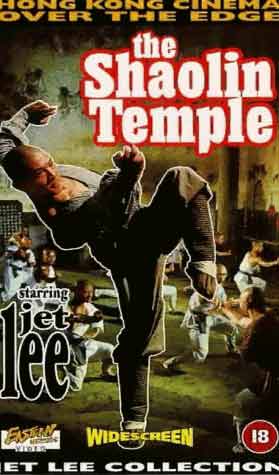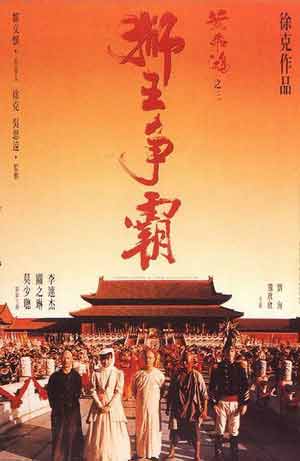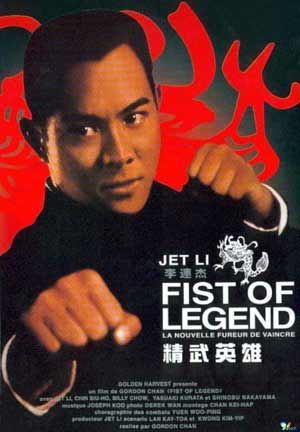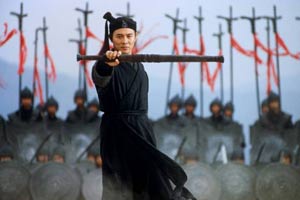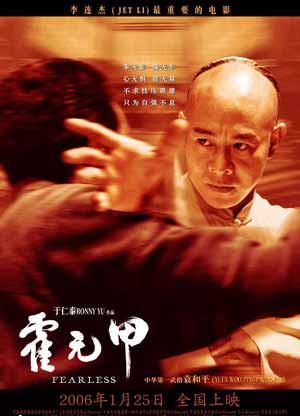| Tools: Save | Print | E-mail | Most Read |
| Jet Li: King of the Kung-Fu Stars |
| Adjust font size: |
From Jet Li has achieved splendid success, whether as a wushu practitioner or as an action star. His handsome appearance, fortitude, and resoluteness, as well as brilliant martial arts movements, have attracted a large audience for him. Known as the "Gene Kelly of the action film," Jet Li is part of the wave of new Asian stars taking The Legend of a Wushu Genius Jet Li was born in Wushu training was always painstaking. In order to have a thorough mastery of basic skills, Jet Li and his fellow students had to practice the same movements day after day. When wintertime came, they had no choice but to practice outside, for there were no indoor facilities. What Jet received was not only the traditional martial arts training; moreover, he was trained as a modern wushu athlete, so he also had to go through the strict physical training. Besides, his coach Wu Bin also encouraged him to study dancing to make his movements more exquisite. The year 1974 saw Jet Li's perfect debut in the national wushu competition, on which he was the all-round youth champion. After winning the national championship, Jet Li was selected as a member of China Wushu Team. As part of a world tour the same year, he also had the honor of performing a two-man fight for President Nixon on the White House lawn. In all, in the following years, Jet Li would travel to more than 40 countries with the team doing demonstrations of wushu. In the following year Jet started to notice a shift in his training. The pressure began to increase. People had higher expectations of him because he'd just won the youth championship. Personally, he didn't think too much of it. He knew that there were plenty of other athletes who trained a lot harder than he did, especially the adults. But winning the youth championships had allowed him to "skip a grade," making him eligible to compete in the 18-and-over category. There he was, a 12-year old competing against people in their 20s and 30s. Once again, his perfect performance caused a sensation in martial arts field in The King of Kung-Fu Stars Traveling abroad at a very young age opened up Jet Li's minds. He learned to think independently from an early age. After winning five all-round championships in Shortly after retiring from the sport at the age of 17, Jet Li was offered many starring roles and subsequently began his film career with director Zhang Xinyan for
Shot with the magnificent background of the Yellow River, reed marsh, and pagodas in the Shaolin Temple, the film featured the Eighteen-Arms in the traditional Chinese martial arts, including Shaolin boxing, Drunk boxing, Eagle claws boxing, and swords. Upon its release, the movie broke all kinds of box-office records in The success of However, like all movie stars, Jet Li then fell into the bust part of the boom-and-bust trajectory of big screen success. He directed and starred in Born to Defense, a World War II epic that fared miserably, both critically and financially. Even worse, Jet's health condition declined during that period. The doctor even declared that he should not work on wushu ever again. Golden Age in Frustrated and dejected, Jet Li decided to go to the
In the first half of the 1990s, The Transition Period The period from 1994 to 1997 could be seen as Jet Li's transition period, during which he tried to break away from the traditional costume piece and take up the modern action film that combined wushu with gunfight. Jet's modern roles in The Bodyguard from Beijing and My Father is a Hero were just as attractive as those in the costumed Wong Fei-Hung and Fong Sai-Yuk series. During this period, there was a film worth special attention -- Fist of Legend. In 1994, Jet Li, Yuen Woo-Ping, and rising director Gordon Chan worked on a remake of Bruce Lee's classic Fist of Fury. Jet was a bit hesitant to work on the film. He was hounded by billings of him being the "next Bruce Lee" his whole cinematic life, and Jet knew, and himself felt, that Lee was somewhat of a "cinematic God" all around the world.
Jet, Chan, and Yuen worked closely together to create a movie that would both satisfy fans of Bruce Lee and Jet Li and also, like the original film, bring in new fans. They decided to forgo much of the "wire-fu" (a style which makes people seem as if they are flying, shooting fireballs, or doing other exaggerated movements by using hidden wires and other camera tricks) Jet had used in most of his previous work and stick with a harder, more realistic style that was closer to Bruce Lee's own work. The result was Jet Li's biggest success in years and what many people consider to be his best movie ever, Fist of Legend. Establishing a Reputation in After his huge success in Hong Kong, Jet Li decided to try himself at
In 2002, the film Hero starring Jet Li was released in the By then, Jet Li had already established himself in Fearless: The Closing of Martial Arts Films Jet Li brought Fearless with him back to
Preparations for the movie started in 2003. It was also incidentally the time that Jet discovered that 280,000 people in Jet Li touched all the audiences with his penetrating performance in the movie Fearless. Although nearly poisoned to his last gasp, Huo Yuan Jia resolutely decided to complete the Kong Fu contest with a Japanese martial arts master. When poisoned-tortured Huo could put the Japanese Kong Fu master into a deathtrap, Huo made a fake movement to spare his life. Moved by Huo's noble mind, the Japanese Kong Fu master bowed down and admitted his defeat. But Huo passed away. Anti-violence: the essence of wushu Undoubtedly, Jet Li's quitting of martial arts films is a great pity for his fans. People feel curious about such a decision. Jet Li explained the reason with his understanding of wushu. He believes that wushu is not practiced for revenge, but rather is a sheer way to avoid dangers. Actually in his previous films Danny the Dog and Hero, Jet has already tried to convey such a belief. "Violence is not the way for solving problems, and we need a peaceful world," said Jet. "The breakdown of the character 'Wu'(武), which carries the meaning of martial arts, means the stoppage of violence, which best reflects the broad and tolerant anti-war sentiments of Eastern people." Profile of Jet Li: Birth: April 26, Spouse: Nina Chi Li Children: 2 daughters from a previous marriage, 2 daughters from his current marriage Name: Li Lian Jie (Mandarin), Li Lin Kit (Cantonese) Height: Weight: Filmography: 2006: Fearless 2005: Danny the Dog (2005) 2005: Unleashed (2005) 2003: Cradle 2 The Grave (2003) 2002: Hero (2002) 2001: The One (2001) 2001: Kiss Of The Dragon (2001) 2000: Romeo Must Die (2000) 1998: Hitman (1998) 1998: Lethal Weapon 4 (1998) 1997: Once Upon A Time In 1996: Black Mask (1996) 1996: Dr. Wai in "Scripture With No Words" 1995: The Bodyguard from 1995: High Risk (1995) 1994: The New Legend Of Shaolin (1994) 1994: Fist of Legend (1994 1994: Bodyguard from 1993: The Tai Chi Master 1993: The Last Hero in 1993: The Kung Fu Cult Master 1993: The Legend of Fong Sai-Yuk II 1993: The Legend of Fong Sai-Yuk 1992: Once Upon a Time in 1992: Swordsman II 1989: The Master 1991: Once Upon a Time in 1990: Once Upon a Time in 1989: Dragons of the Orient 1988: Dragon Fight 1986: 1986: Born to Defence 1984: 1982: (chinaculture March 3, 2006) |
| Tools: Save | Print | E-mail | Most Read |
 |
| Related Stories |
|
Product Directory China Search |
Country Search Hot Buys |
